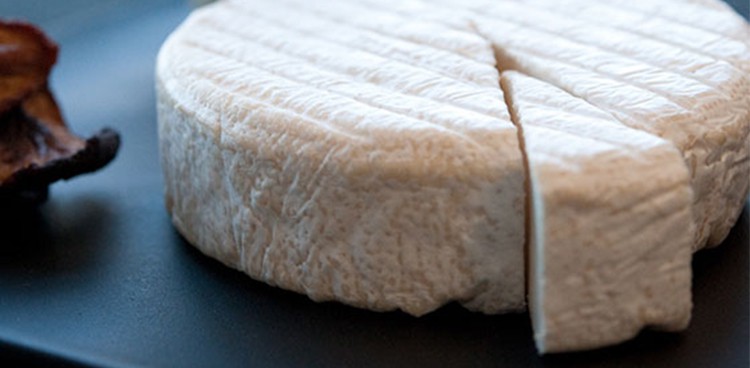
Nestled among the pungent blues and chèvres at many Whole Foods Markets are small wooden containers holding round bloomy rinds swathed in paper. If you were to unwrap a wheel, slice into it, and take a bite, you might think it was a mild Camembert. In many ways, you’d be right.
Back in 2010, long-time vegan chef Tal Ronnen, now co-owner of Kite Hill, was consulting with several Las Vegas chefs and asked them to taste a commercial nondairy cheeselike product he thought they could use. The chefs all but spat it out, saying that just because something exists, doesn’t mean it should be used.
“This was when I decided I wanted to create a really good plant-based cheese,” says Ronnen. Five years later, with the help of a Stanford biochemistry professor, a cheesemaker, and a French-born former manager of cheese operations for Laura Chenel’s Chèvre, Kite Hill in California was born with a line of almond milk–based offerings, including that Camembert-like round.
“We carry Kite Hill cheeses first because the products taste great,” says Cathy Strange, global cheese buyer for Whole Foods Market, who also judges domestic and international cheese contests. “What sets this company apart is that they are applying traditional cheesemaking techniques to an alternative milk product.” (Kite Hill is exclusive to Whole Foods.)
Kite Hill pasteurizes freshly made almond milk before using time-honored techniques and cheesemaking equipment to add a proprietary blend of enzymes and cultures to the almond milk to create curds and whey. Staffers then transform the curds into chive cream cheese (a dead ringer for Boursin); ricotta; fresh rounds flavored with truffle, chive, and dill; and a bloomy-rind wheel moved through aging rooms for two to three weeks. In the works are a chèvre-like product with a goat cheese taste, a Geotrichum-rind style, and a blue variety.
Made in a less traditional manner and sans coagulants are several other boutique plant-based spreads and wheels flooding the market, including Minnesota’s Punk Rawk Labs smoked salt-and-black-pepper block; New York’s Treeline Treenut Cheese disk spiked with garlic and herbs; Brooklyn-based Dr. Cow’s aged macadamia nut round rolled in herbs; and Oregon’s Heidi Ho spread streaked with crushed hazelnuts and black lava salt. Vastly different from commercial vegan cheese products, these new artisanal offerings contain water and freshly ground nuts enriched with enzymes and cultures for flavor and fermentation purposes, plus seasonings like miso and nutritional yeast for a savory, umami-like richness.

Photo courtesy Miyoko’s Kitchen
“I was a cheese fanatic but initially gave it up for health reasons,” says Miyoko Schinner, author of Artisan Vegan Cheese (Book Publishing Co., Aug. 2012) and founder of year-old Miyoko’s Kitchen, which makes ten different cashew-based wheels. “I chose cashews because you don’t have to add a thickening agent. They also have the most neutral taste and become totally smooth when pureed.” Schinner adds different cultures to the nut paste and employs European practices, such as rubbing the rounds with ash and wrapping them in wine-soaked fig leaves.
But as satisfying as these products may taste on a cracker alongside a glass of wine, should they be called cheese?
No, says Patrick Geoghegan, senior vice president of corporate communications at the Wisconsin Milk Marketing Board, because cheese has a standard of identity that is regulated by the Food & Drug Administration (FDA). Under the Code of Federal Regulations for Cheeses and Related Cheese Products, “milk” is defined as the lacteal secretion from one or more cows—a definition that is expanded to include sheep’s milk and goat’s milk in reference to certain cheese styles.
“My position is that Kite Hill is using an alternative milk product to make what I call cheese because it follows the cheesemaking methodology,” says Strange of Whole Foods Market. “The other nondairy alternatives to cheese are not made in the same manner,” meaning the milk is not coagulated to form a curd before being drained from the whey and put into molds. This explains why Whole Foods Market stocks Heidi Ho, Treeline Cheese, and Miyako’s Kitchen in the dairy section versus the cheese case.
Kite Hill’s Ronnen argues that California “allowed milks to be called soy milk and coconut milk,” implying the state should be equally as flexible with the term “cheese.” (For now, however, Kite Hill has limited use of the word on its labels and website.)
Regardless of how things shake out—or whether the FDA expands its current definition of cheese to include alternative milks—these boutique makers have found a growing audience for their plant-based products. In addition to vegans and the lactose intolerant, health-oriented consumers keen to cut back on cholesterol are buying the wheels and spreads, which are carefully crafted with high-quality ingredients to be appreciated on their own merits, cheese or not.
Feature Photo Credit: Kite Hill




